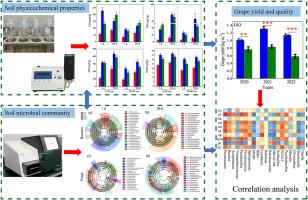当前位置:
X-MOL 学术
›
Eur. J. Soil Biol.
›
论文详情
Our official English website, www.x-mol.net, welcomes your feedback! (Note: you will need to create a separate account there.)
Responses of grape yield and quality, soil physicochemical and microbial properties to different planting years
European Journal of Soil Biology ( IF 4.2 ) Pub Date : 2023-12-11 , DOI: 10.1016/j.ejsobi.2023.103587 Qingjie Li , Okbagaber Andom , Yanli Li , Chongyang Cheng , Hui Deng , Lei Sun , Zhaojun Li
European Journal of Soil Biology ( IF 4.2 ) Pub Date : 2023-12-11 , DOI: 10.1016/j.ejsobi.2023.103587 Qingjie Li , Okbagaber Andom , Yanli Li , Chongyang Cheng , Hui Deng , Lei Sun , Zhaojun Li

|
As an economically important fruit crop, continuous cropping of grapes can potentially impact soil health resulting in decreased yields. However, the mechanism of how soil microecological environment affects grape quality at different growth stages is not fully understood. A field experiment was conducted to investigate the effects of continuous grape cultivation for 0, 7, and 12 (CK, G7Y and G12Y) years on soil physicochemical properties and microbial community at different growth periods and soil depths, as well as on grape yield and quality. The results showed that grape yield, aroma compound contents, soil and grape leaf nutrients decreased significantly with the increase of planting years, soil acidification and secondary salinization intensified. Compared to G7Y, the relative abundance of the beneficial soil microorganisms , and decreased significantly in G12Y, while the relative abundance of the potential pathogenic fungi and increased significantly. In addition, the nutrient content and biomarkers in the subsoil were lower than those in the topsoil. Particularly, the fruit setting stage appeared to be more sensitive to shifts in soil microbial communities over different planting years. Correlation analysis showed that grape yield was positively correlated with and , and negatively correlated with . Grape yield was more sensitive to phosphorus and potassium fertilizers than to nitrogen fertilizer. In conclusion, continuous cropping reduced the content of soil nutrients and the number of soil beneficial microorganisms, increased the abundance of soil pathogenic microorganisms, and jointly caused changes in grape yield and quality. Therefore, it is necessary to optimize the management strategies to improve the soil microbial diversities especially beneficial microbial diversity to maintain the soil health and then to promote sustainable production of vineyards.
中文翻译:

不同种植年限葡萄产量品质、土壤理化及微生物特性的响应
作为一种重要的经济水果作物,连续种植葡萄可能会影响土壤健康,导致产量下降。然而,不同生育阶段土壤微生态环境影响葡萄品质的机制尚不完全清楚。通过田间试验,研究葡萄连作0年、7年、12年(CK、G7Y、G12Y)对不同生长期、土壤深度土壤理化性质、微生物群落以及对葡萄产量和产量的影响。质量。结果表明,随着种植年限的增加,葡萄产量、香气化合物含量、土壤和葡萄叶片养分显着下降,土壤酸化和次生盐渍化加剧。与G7Y相比,G12Y土壤有益微生物、 和 的相对丰度显着下降,而潜在病原真菌、 和 的相对丰度显着增加。此外,底土中的养分含量和生物标志物低于表土。特别是,坐果阶段似乎对不同种植年份土壤微生物群落的变化更加敏感。相关分析表明,葡萄产量与 和 呈正相关,与 呈负相关。葡萄产量对磷、钾肥的敏感性高于对氮肥的敏感性。综上所述,连作降低了土壤养分含量和土壤有益微生物数量,增加了土壤病原微生物丰度,共同引起葡萄产量和品质的变化。因此,有必要优化管理策略,提高土壤微生物多样性,特别是有益微生物多样性,以维持土壤健康,进而促进葡萄园的可持续生产。
更新日期:2023-12-11
中文翻译:

不同种植年限葡萄产量品质、土壤理化及微生物特性的响应
作为一种重要的经济水果作物,连续种植葡萄可能会影响土壤健康,导致产量下降。然而,不同生育阶段土壤微生态环境影响葡萄品质的机制尚不完全清楚。通过田间试验,研究葡萄连作0年、7年、12年(CK、G7Y、G12Y)对不同生长期、土壤深度土壤理化性质、微生物群落以及对葡萄产量和产量的影响。质量。结果表明,随着种植年限的增加,葡萄产量、香气化合物含量、土壤和葡萄叶片养分显着下降,土壤酸化和次生盐渍化加剧。与G7Y相比,G12Y土壤有益微生物、 和 的相对丰度显着下降,而潜在病原真菌、 和 的相对丰度显着增加。此外,底土中的养分含量和生物标志物低于表土。特别是,坐果阶段似乎对不同种植年份土壤微生物群落的变化更加敏感。相关分析表明,葡萄产量与 和 呈正相关,与 呈负相关。葡萄产量对磷、钾肥的敏感性高于对氮肥的敏感性。综上所述,连作降低了土壤养分含量和土壤有益微生物数量,增加了土壤病原微生物丰度,共同引起葡萄产量和品质的变化。因此,有必要优化管理策略,提高土壤微生物多样性,特别是有益微生物多样性,以维持土壤健康,进而促进葡萄园的可持续生产。



























 京公网安备 11010802027423号
京公网安备 11010802027423号